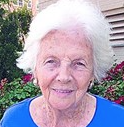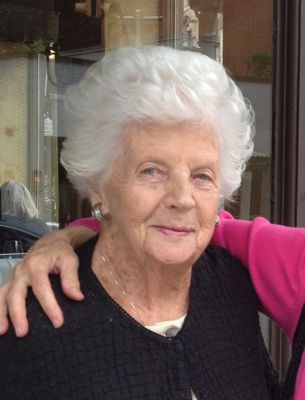Frank Eltman, Associated Press,Associated Press 4 minutes 49 seconds ago Comments Like Reblog on Tumblr Share Tweet Email
MINEOLA, N.Y. (AP) -- Lucille Conlin Horn weighed barely 2 pounds when she was born, a perilous size for any infant, especially in 1920. Doctors told her parents to hold off on a funeral for her twin sister who had died at birth, expecting she too would soon be gone.
But her life spanned nearly a century after her parents put their faith in a sideshow doctor at Coney Island who put babies on display in incubators to fund his research to keep them alive.
The Brooklyn-born woman, who later moved to Long Island, died Feb. 11 at age 96, according to the Hungerford & Clark Funeral Home. She had been suffering from Alzheimer's disease.
Horn was among thousands of premature babies who were treated in the early 20th century by Dr. Martin Couney. He was a pioneer in the use of incubators who sought acceptance for the technology by showing it off on carnival midways, fairs and other public venues. He never accepted money from the tiny babies' parents but instead charged oglers admission to see the babies struggling for life.
Horn and her twin were born prematurely. She said in 2015 that when her sister died, doctors told her father to hold off on a funeral because she wouldn't survive the day.
"He said, 'Well, that's impossible. She's alive now. We have to do something for her,'" Horn said. "My father wrapped me in a towel and took me in a cab to the incubator. I went to Dr. Couney. I stayed with him quite a few days, almost five months."
Couney, who died in 1950 and is viewed today as a pioneer in neonatology, estimated that he successfully kept alive about 7,500 of the 8,500 children who were taken to his "baby farm" at the Coney Island boardwalk. They remained there until the early 1940s, when incubators became widely used in hospitals.
He also put infants on display at the World's Fair and other public venues during his career. There's no estimate on how many still are alive today.
Horn worked as a crossing guard and then as a legal secretary for her husband. She is survived by three daughters and two sons. She said she met Couney when she was about 19 and thanked him for what he had done.
"I've had a good life," she said in 2015.
After a funeral Tuesday, she was buried at the Cemetery of the Evergreens in Brooklyn, next to her twin sister.
Lucille Horn, who as an infant was among an early generation that survived the long odds of premature birth by spending months in a sideshow incubator at Coney Island, died Feb. 11 of Alzheimer’s disease.
The Long Beach resident was 96.
Doctors gave Horn no chance of surviving when she was born with a twin on May 16, 1920, her daughter Barbara Horn of Long Beach said. Lucille Horn’s twin sister died shortly after birth, and Horn weighed just 2 pounds.
Her father, the late Woolsey Wells Conlin, would not accept the inevitable. Instead, he wrapped his daughter in a blanket and took her to a sideshow he’d seen at Coney Island that charged visitors 25 cents to see a new phenomenon: tiny premature-birth babies kept alive in the warm, steady temperature of incubators. At the time, hospitals did not approve of them. The admission was used to fund the infants’ care.
Horn thrived, and later in her life visited the sideshow and the doctor who saved her, according to an account on National Public Radio.
Barbara Horn said her mother “always felt very fortunate and grateful” for the critical months she spent under the care of Dr. Martin Couney, who pioneered the incubators. The devices now are standard hospital equipment.
Horn even hosted an “incubator-baby” party at her home three years ago for eight other survivors. “She talked about the incubators all through her life,” Barbara Horn said.
Medical miracles didn’t end for Horn in the incubator. She was among the early U.S. patients of Dr. John Insal, who pioneered the artificial knee, receiving new knees in 1985 and 1986. They kept her walking well into her 90s, her daughter said.
Horn was born and raised in Brooklyn, went to Erasmus Hall High School, and met and married her husband, Clarence E. Horn Jr., in the borough. The couple married in 1942, and moved to Freeport in 1950. He was a lawyer in Rockville Centre, and Lucille Horn, after raising her five children and working as a Freeport crossing guard, later worked as his legal secretary. She converted to Catholicism at marriage and was a longtime congregant of Our Holy Redeemer Roman Catholic Church in Freeport.
Lucille Horn led an active social life, always quick to say yes when visitors needed a place to stay. “She just really appreciated people and had a basic happiness,” Barbara Horn said. “She tried to say yes to life. She was always welcoming. ‘Bring the dog,’ she’d say.”
She loved to shop, particularly for shoes at Nordstrom’s, and took a special interest in her daughter’s work in Sept. 11 commemoration events, helping in recent years in an annual flag-folding ceremony in lower Manhattan.
She was preceded in death by a sister, Jane Northridge.
Mother: Marion "Raymond" Conlin
In addition to her daughter, Lucille Horn is survived by sons Lance Horn of Largo, Florida and Paul Horn of Irvine, California; two other daughters, Julie Horn of Reno and Clare Horn of Riverdale; a sister, Dorothy Hultman of Naples, Florida; eight grandchildren, and four great-grandchildren.
After a service at St. Mary of the Isle on Feb. 21, Horn was buried at The Cemetery of the Evergreens in Brooklyn, in a plot with her twin sister, Barbara Horn said.
Frank Eltman, Associated Press,Associated Press 4 minutes 49 seconds ago Comments Like Reblog on Tumblr Share Tweet Email
MINEOLA, N.Y. (AP) -- Lucille Conlin Horn weighed barely 2 pounds when she was born, a perilous size for any infant, especially in 1920. Doctors told her parents to hold off on a funeral for her twin sister who had died at birth, expecting she too would soon be gone.
But her life spanned nearly a century after her parents put their faith in a sideshow doctor at Coney Island who put babies on display in incubators to fund his research to keep them alive.
The Brooklyn-born woman, who later moved to Long Island, died Feb. 11 at age 96, according to the Hungerford & Clark Funeral Home. She had been suffering from Alzheimer's disease.
Horn was among thousands of premature babies who were treated in the early 20th century by Dr. Martin Couney. He was a pioneer in the use of incubators who sought acceptance for the technology by showing it off on carnival midways, fairs and other public venues. He never accepted money from the tiny babies' parents but instead charged oglers admission to see the babies struggling for life.
Horn and her twin were born prematurely. She said in 2015 that when her sister died, doctors told her father to hold off on a funeral because she wouldn't survive the day.
"He said, 'Well, that's impossible. She's alive now. We have to do something for her,'" Horn said. "My father wrapped me in a towel and took me in a cab to the incubator. I went to Dr. Couney. I stayed with him quite a few days, almost five months."
Couney, who died in 1950 and is viewed today as a pioneer in neonatology, estimated that he successfully kept alive about 7,500 of the 8,500 children who were taken to his "baby farm" at the Coney Island boardwalk. They remained there until the early 1940s, when incubators became widely used in hospitals.
He also put infants on display at the World's Fair and other public venues during his career. There's no estimate on how many still are alive today.
Horn worked as a crossing guard and then as a legal secretary for her husband. She is survived by three daughters and two sons. She said she met Couney when she was about 19 and thanked him for what he had done.
"I've had a good life," she said in 2015.
After a funeral Tuesday, she was buried at the Cemetery of the Evergreens in Brooklyn, next to her twin sister.
Lucille Horn, who as an infant was among an early generation that survived the long odds of premature birth by spending months in a sideshow incubator at Coney Island, died Feb. 11 of Alzheimer’s disease.
The Long Beach resident was 96.
Doctors gave Horn no chance of surviving when she was born with a twin on May 16, 1920, her daughter Barbara Horn of Long Beach said. Lucille Horn’s twin sister died shortly after birth, and Horn weighed just 2 pounds.
Her father, the late Woolsey Wells Conlin, would not accept the inevitable. Instead, he wrapped his daughter in a blanket and took her to a sideshow he’d seen at Coney Island that charged visitors 25 cents to see a new phenomenon: tiny premature-birth babies kept alive in the warm, steady temperature of incubators. At the time, hospitals did not approve of them. The admission was used to fund the infants’ care.
Horn thrived, and later in her life visited the sideshow and the doctor who saved her, according to an account on National Public Radio.
Barbara Horn said her mother “always felt very fortunate and grateful” for the critical months she spent under the care of Dr. Martin Couney, who pioneered the incubators. The devices now are standard hospital equipment.
Horn even hosted an “incubator-baby” party at her home three years ago for eight other survivors. “She talked about the incubators all through her life,” Barbara Horn said.
Medical miracles didn’t end for Horn in the incubator. She was among the early U.S. patients of Dr. John Insal, who pioneered the artificial knee, receiving new knees in 1985 and 1986. They kept her walking well into her 90s, her daughter said.
Horn was born and raised in Brooklyn, went to Erasmus Hall High School, and met and married her husband, Clarence E. Horn Jr., in the borough. The couple married in 1942, and moved to Freeport in 1950. He was a lawyer in Rockville Centre, and Lucille Horn, after raising her five children and working as a Freeport crossing guard, later worked as his legal secretary. She converted to Catholicism at marriage and was a longtime congregant of Our Holy Redeemer Roman Catholic Church in Freeport.
Lucille Horn led an active social life, always quick to say yes when visitors needed a place to stay. “She just really appreciated people and had a basic happiness,” Barbara Horn said. “She tried to say yes to life. She was always welcoming. ‘Bring the dog,’ she’d say.”
She loved to shop, particularly for shoes at Nordstrom’s, and took a special interest in her daughter’s work in Sept. 11 commemoration events, helping in recent years in an annual flag-folding ceremony in lower Manhattan.
She was preceded in death by a sister, Jane Northridge.
Mother: Marion "Raymond" Conlin
In addition to her daughter, Lucille Horn is survived by sons Lance Horn of Largo, Florida and Paul Horn of Irvine, California; two other daughters, Julie Horn of Reno and Clare Horn of Riverdale; a sister, Dorothy Hultman of Naples, Florida; eight grandchildren, and four great-grandchildren.
After a service at St. Mary of the Isle on Feb. 21, Horn was buried at The Cemetery of the Evergreens in Brooklyn, in a plot with her twin sister, Barbara Horn said.
Family Members
Sponsored by Ancestry
Advertisement
Records on Ancestry
Advertisement





